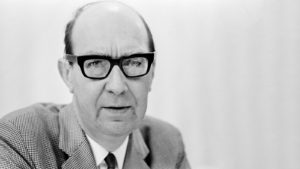What is the point of university? It used to be, when Harvard was founded in 1636, “to advance learning and perpetuate it to posterity”. But in recent years the university has taken on an altogether narrower character. Learning is no longer enough. Activism is demanded. Yale and Harvard have come to resemble the mythical Ouroboros, eating their own tails to satisfy an insatiable appetite for conformity.
In 1951, William F. Buckley Jr. warned in God and Man at Yale of his alma mater’s inability to prepare its students for the real world. Its subtitle, The Superstitions of “Academic Freedom”, hinted at the already existing tendency for administrators to hire academics who only teach ideas they deem acceptable. Scepticism was banished: to Buckley, political radicals were subverting American society by indoctrinating their students with atheism and collectivism. Yet he remained an “epistemological optimist”, hoping that sense would prevail both in the Ivy League and across the nation.
More than 70 years later, that sense has manifestly not prevailed. Take the case of Roland Fryer. A hugely gifted and until recently celebrated black professor of economics at Harvard, he was suspended for two years without pay following the most tenuous sexual harassment claims. Many suspect the real reason for his humiliating treatment was his research showing that African Americans are not disproportionately the targets of lethal violence by the police. There were, Fryer wrote, “no racial differences in either the raw data or when contextual factors are taken into account”.
Though published well before the Black Lives Matter protests of 2020 decided that the police were state-funded agents of racial oppression, Fryer’s research nevertheless made him enemies in the academic world. Though he was only following the evidence, he had offended the progressives who now dominate the university’s governance and culture. On Fryer’s return to campus after two years of exclusion, the Harvard Crimson newspaper had only this to say: “Fryer should not return to Harvard classrooms.” Similar stories can be told about other illustrious institutions. Joshua Katz, a tenured Classics professor at Princeton, was not merely suspended but fired this year over a long-ago relationship with a student. Given the investigation into his behaviour was based on selective evidence, it seems likely his real crime was daring to criticise Black Lives Matter.
If universities once made promises to teach their undergraduates how to think, they now aim to teach them what to think. Students are now taught that disparities between groups are always the result of discrimination; the US is irredeemably racist; racism is everywhere; invisible power structures of structural oppression are equally ubiquitous and need to be dismantled; meritocracy is a myth; colour-blindness is a misleading concept; a focus on individual rights distracts from the real struggle. Gone are those such as Roland Fryer who sought to inquire freely into the most important questions facing society today through well-gathered evidence and rigorous logic. Hounded out by a vocal minority of thin-skinned students and zealous administrators, they are replaced by progressive conformists.
It was with these issues in mind that, last week, I taught five classes on freedom of speech at the new University of Austin. UATX is intended to be a free-thinking, free-speaking alternative to existing universities, and our summer school was aimed at attracting current undergraduates from precisely those places. But while one could have forgivingly expected at least some of these students to be scared of questioning progressive orthodoxies, the reality couldn’t have been more different.
These students were hungry for knowledge, eager to learn and to excel — and yet many of them hailed from established institutions such as Dartmouth, Brown, Berkeley. Others came from overseas: the Sorbonne in Paris and the University of British Columbia in Canada. My class was an equally diverse group of students: three women, one transgender person, and seven men. One student was of Moroccan origin, another of Indian ethnicity. On paper, they were a diversity, equity and inclusion officer’s dream.
However, far from protesting that the US was a “structurally racist” society oppressive to supposedly marginalised communities, the students I met were eager to be of service to their country, culture, and society at large. Not one was in the slightest bit woke.
Yet what they taught me in the five sessions we had together was the near-absence of critical thinking and free inquiry in their respective universities. Even the Frenchman said there was very little debate in the Sorbonne. The American students suggested that most of their peers were just like them: eager to learn, debate, and compete — all in a civil manner. What they worried about was a minority of students, professors and administrators who spoil the experience of college for everyone by grandstanding, virtue signalling, and enforcing the tenets of progressive orthodoxy. Those in student government and student media certainly didn’t represent the majority, they said. Their union policies and mantras spoke only to the small group inside their autocratic bubble.
It was clear from my conversations with the students at UATX that the elite educational institutions are doing the next generation a fundamental disservice. If we are to teach the leaders of tomorrow how to think — how to ask probing questions rather than repeat dictated answers — we need a fundamental re-evaluation of the modern university. It’s clear these institutions are still in high demand — just look at Harvard’s ever-increasing application numbers — but that doesn’t mean they are fulfilling their function.
Harvard’s motto is a single word: Veritas. Yale’s is Lux et Veritas. But truth is the first casualty of progressivism. And as for light, there is a great deal more heat generated by the endless identity politics of the modern campus. Still, I came away from the UATX summer school feeling relieved. Young people — some of them, at least — don’t want indoctrination. But the only way to get back to “advancing learning and perpetuating it to posterity” is to found new universities. Let’s not forget: even Harvard was a start-up once.
Disclaimer
Some of the posts we share are controversial and we do not necessarily agree with them in the whole extend. Sometimes we agree with the content or part of it but we do not agree with the narration or language. Nevertheless we find them somehow interesting, valuable and/or informative or we share them, because we strongly believe in freedom of speech, free press and journalism. We strongly encourage you to have a critical approach to all the content, do your own research and analysis to build your own opinion.
We would be glad to have your feedback.
Source: UnHerd Read the original article here: https://unherd.com




